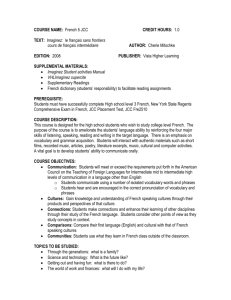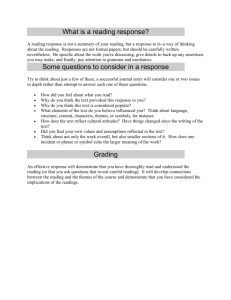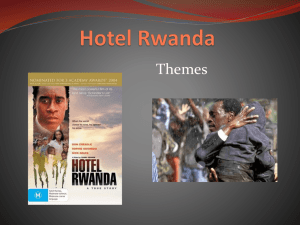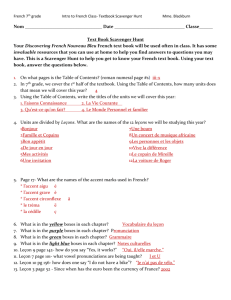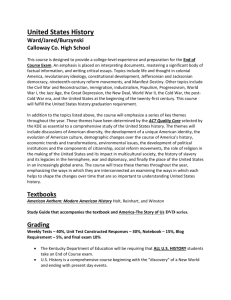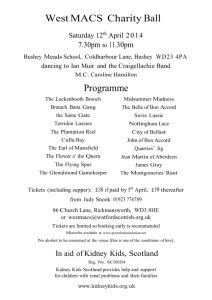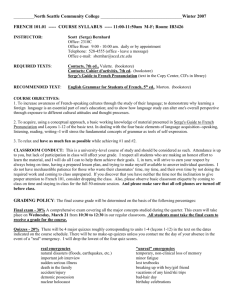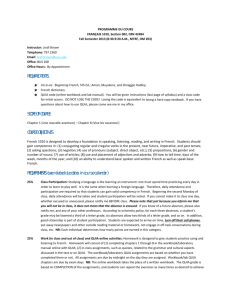MODL AP French Syllabus 2015
advertisement
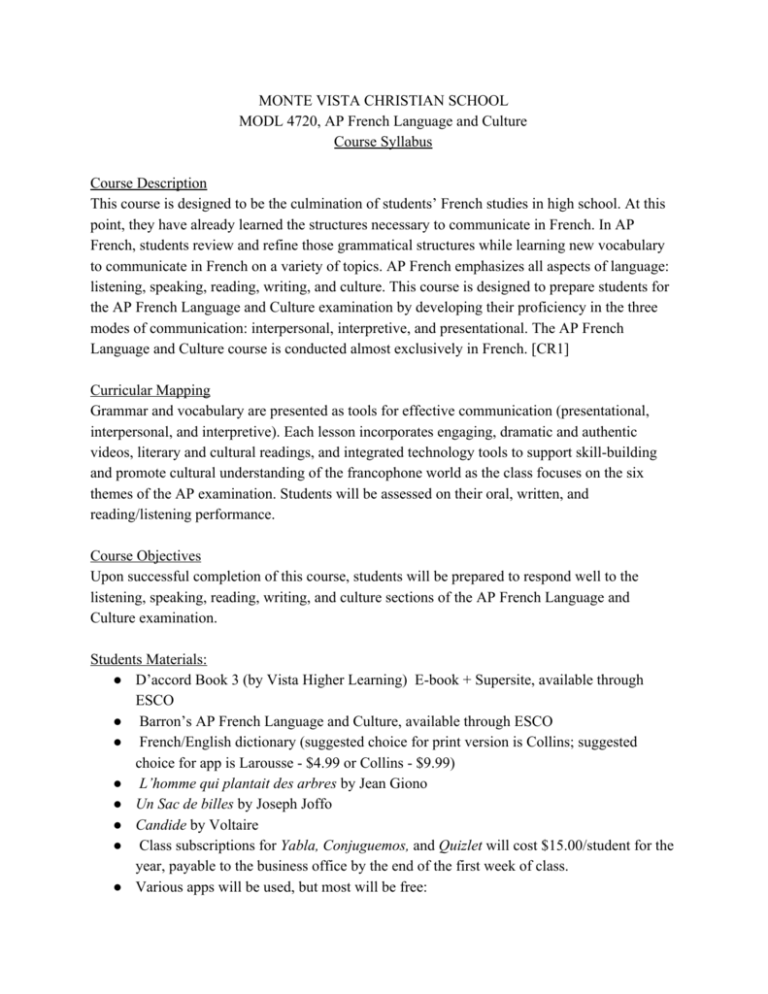
MONTE VISTA CHRISTIAN SCHOOL MODL 4720, AP French Language and Culture Course Syllabus Course Description This course is designed to be the culmination of students’ French studies in high school. At this point, they have already learned the structures necessary to communicate in French. In AP French, students review and refine those grammatical structures while learning new vocabulary to communicate in French on a variety of topics. AP French emphasizes all aspects of language: listening, speaking, reading, writing, and culture. This course is designed to prepare students for the AP French Language and Culture examination by developing their proficiency in the three modes of communication: interpersonal, interpretive, and presentational. The AP French Language and Culture course is conducted almost exclusively in French. [CR1] Curricular Mapping Grammar and vocabulary are presented as tools for effective communication (presentational, interpersonal, and interpretive). Each lesson incorporates engaging, dramatic and authentic videos, literary and cultural readings, and integrated technology tools to support skill­building and promote cultural understanding of the francophone world as the class focuses on the six themes of the AP examination. Students will be assessed on their oral, written, and reading/listening performance. Course Objectives Upon successful completion of this course, students will be prepared to respond well to the listening, speaking, reading, writing, and culture sections of the AP French Language and Culture examination. Students Materials: ● D’accord Book 3 (by Vista Higher Learning) E­book + Supersite, available through ESCO ● Barron’s AP French Language and Culture, available through ESCO ● French/English dictionary (suggested choice for print version is Collins; suggested choice for app is Larousse ­ $4.99 or Collins ­ $9.99) ● L’homme qui plantait des arbres by Jean Giono ● Un Sac de billes by Joseph Joffo ● Candide by Voltaire ● Class subscriptions for Yabla, Conjuguemos, and Quizlet will cost $15.00/student for the year, payable to the business office by the end of the first week of class. ● Various apps will be used, but most will be free: ○ Duolingo French (free) ○ French Verb Conjugation – Maître de Conjugaison by Joseph Williamson (you will need to buy the upgrade for $5.99) ○ French Verb Conjugator/Conjugation with Vatefaireconjuguer.com by GymGlish A9 (free) ○ Doceri (free) ○ Notability or another note­taking app (you should have this already) ○ iMovie or another movie­making app (you should have this already) ○ Google Docs (free) ○ Google Slides (free) ○ Keynote or another presentation app (you should have this already) ○ Learn French with 7 Jours sur la planète by TV5MONDE for $4.99 ○ France 24 app by France Medias Monde (free – choose French as the preferred language) ○ Radio­Canada by News (free) ○ Radios France: France Radios include many Radio France… by Xingping Ding (free) ○ Belgium Radio Player – listen free online fm am live streaming… by Teik Leong Lee (free) ○ French Guiana Radio Live Player (Cayenne/French/fr…) by Teik Leong Lee (free) ○ Le Figaro.fr by Société du Figaro (free) ○ Le Monde Archives by Le monde.fr (free) Resources (no need to purchase): ● Schaum’s French Vocabulary by Mary E. Coffman Crocker ● Schaum’s French Grammar by Mary E. Coffman Crocker ● http://www.france2.fr/ ● http://www.tv5monde.com/ ● http://www.bonjourdefrance.com/ ● http://www.lemonde.fr/ ● http://www.lefigaro.fr/ ● http://www.rfi.fr/ ● http://onethinginafrenchday.podbean.com/ ● http://www.france24.com/en/livefeed Prerequisites Completion of French III (if recommended by the teacher) or IV with a grade of B­ or better, unless special permission is granted by the teacher. Course Outline Following the themes of the AP French Language and Culture Exam (including sample resources and activities): 1. Personal and Public Identities a. sub­themes: alienation & assimilation; beliefs and values; language and identity; multiculturalism; nationalism/patriotism b. D'accord Leçon 2 (towns and cities) – reflexive and reciprocal verbs, descriptive adjectives and adjective agreement, adverbs, la France, et la fête de la musique c. Un sac de billes d. Excerpts from L’elegance du Herrison e. Excerpts from Monsieur Ibrahim f. discussion surrounding book topics [6RD][CR7] 2. Families and Communities a. sub­themes: childhood & adolescence; customs & ceremonies; family structures; friendship & love b. D'accord Leçon 1 (relationships) – spelling­change verbs, irregular verbs avoir, faire, aller, être, forming questions, les États­Unis, et les francophones d’Amerique c. D'accord Leçon 6 (families, stages of life, food) – subjunctive (impersonal expressions, will, opinion, and emotion), demonstrative pronouns, irregular –re verbs, l’Afrique du Nord et le Liban jour de marriage d. Excerpts from Le Papillon e. presentations after synthesizing information from written material (news articles, literature) and responses [CR4B], [CR5A] f. possible partnerships with French students ­ email/Skype, etc. in order to compare cultures and discuss various topics within the six AP themes. [CR3B][CR6E][CR7][CR8] 3. Contemporary Life a. sub­themes: education; leisure & sports; holidays & celebrations; housing & shelter; professions; travel b. D'accord Leçon 5 (contemporary life) – partitives, the pronouns y and en , order of pronouns, l’Afrique de l’Ouest, et la jeunesse africaine c. D'accord Leçon 8 (leisure activities, sports, shopping) – infinitives, prepositions with geographical names, the conditionnel, l’océan Indien, et la Réunion d. Excerpts from Etre et avoir, Entre les Murs e. Discuss issues of contemporary life [CR6C] 4. Global Challenges a. sub­themes: economic issues; environmental issues; health issues; human rights; peace and war b. D'accord Leçon 4 (human rights and politics) – plus­que­parfait, negation and indefinite adjectives and pronouns, irregular –ir verbs, les Antilles, et Haït, c. D'accord Leçon 9 (at the office, banking, finances) – relative pronouns, present participle, irregular –oir verbs, l’Afrique Centrale, des Africaines entrepreneuses d. D'accord Leçon 10 (nature, the environment) – the past conditional, the future perfect, si clauses, la Polynésie française, la Nouvelle­Calédonie, l’Asie, et les richesses du Pacifique e. L’homme qui plantait des arbres [CR2C] f. Excerpts from Oscar et la dame rose g. Excerpts from Joyeux Noël [CR2A] h. http://www.france24.com/en/livefeed for subject matter related to various sub­themes [CR2A] i. debates on controversial issues [CR3A], [CR6A] 5. Science and Technology a. sub­themes: ethical questions; future technologies; the new media; social impact of technology b. D'accord Leçon 3 (news and media) – passé compose with avoir and être, passé compose vs. imparfait, et le Québec c. D'accord Leçon 7 (Technology and inventions, the sciences) ­ comparative/ superlative of adjectives and adverbs, future simple, subjunctive with expressions of doubt and conjunctions, past subjunctive, la Belgique, la Suisse, la Luxembourg, et CERN d. various articles/news reports from online sources, like http://www.france24.com/en/livefeed for subject matter related to various sub­themes [CR2B] e. presentations on various sub­themes and discussion/responses in response to audio or audio­visual recordings about science and technology [CR4A] [CR6B] 6. Beauty and Aesthetics a. sub­themes: architecture; ideals of beauty; literature; music; performing arts; visual b. various works of art, music, les arts plastiques, dance, literature, architecture c. Candide , Cyrano de Bergerac d. spontaneous analytical discussion following the introduction of various works of art [CR6F] e. written response/presentation of ideas in response to a work of literature [CR5B] f. possible field trip to a museum with a French tour [CR7] g. possible guest speaker/cooking class [CR7][CR8] h. possible field trip to a French bakery or restaurant to practice communicating in the target language [CR9] ** CR = Curricular Requirements, as laid out by the College Board Grading: Grade Book Categories Classwork & Homework 20% Tests and Quizzes 40% Projects/Essays/Oral Reports 30% Classroom Participation 10% Semester Weighted Grading Configuration Quarter 40% Quarter 40% Final Exam 20% The semester grade calculation for AP French is 40% for the first quarter, 40% for the second quarter and 20% for the final exam. This course will be graded on the following major components: ● Classwork & Homework – 20% ● Much work for this course will be done in class. In­class work and homework can include reading, completing book work, watching/responding to videos, completing written assignments, drilling vocabulary, verbs, and phrases, taking notes, and, of course, studying. Please note that all work needs to be handed in on time. ● Classwork/Homework: Full credit will be issued if turned in by the bell that marks the beginning of class. Any work turned in after the bell but within 24 hours will receive 50% credit. After 24 hours, no credit will be given for late work. ● Homework expectations per week : There will be no more than five hours of homework per week in order for students to be sufficiently prepared to pass the AP French Language and Culture examination. ● Tests and Quizzes – 40% ● Tests will require you to be familiar with the material we have studied, and tests may be cumulative. Tests will come in the form of multiple choice, short answer, and essays. Please note—if you know about a test before an absence you will be required to take the test directly upon returning to school. Quizzes will be given periodically to challenge you to keep up to date with the material. A quiz may be given on short notice or with no notice whatsoever. ● Projects/Essays/Oral Reports – 30% ● Projects will provide opportunities for you to go in­depth with a particular topic we are studying. You will be able to express yourself creatively and artistically. Some projects will provide the opportunity to work cooperatively in groups with your classmates, while others made be accomplished on your own. Writing assignments will allow you to do some research and express yourself through prose. Oral reports will require you present something that you have studied and researched in front of the class. This segment of your grade is where you will be able to demonstrate in a practical manner what you have learned. ● On all work, please note that Google Translate or similar software is not to be used. You need to stick to words and phrases that we have learned, since translation software doesn’t usually provide accurately translated sentences, and the purpose of these projects is to practice and demonstrate the knowledge you have attained. ● Projects and papers will be deducted 25% each day beyond their due date. ● Participation – 10% ○ You are expected to participate in this class. Two of the main pillars of learning a language are listening and speaking. The more you are willing to actively participate in class, the more you and your fellow students will derive benefit. You will be expected to communicate in the target language unless the teacher indicates otherwise. ● Summer work ­­ I will be contacting you this summer to give you some work to do to help you to be prepared for the rigorous work you will be encountering in AP French this fall. It is highly suggested that you do this work so as not to feel lost and overwhelmed. High School Standard Grading Policy : Please refer to the policy and procedures posted online in our Parent­Student Handbook. Class Policies The following policies are non­negotiable. Please see the teacher if you have any concerns with your ability to follow these policies: 1. Respect others and contribute to a safe and accepting environment so that all will feel comfortable taking risks practicing another language. Respect teacher and class time by staying on task and by not being a distraction to others. 2. Attendance: Students are expected to be in class daily. If you are unable to attend, it is your responsibility to get the classwork and homework missed. If you have questions, seek out answers. 3. Tardiness: When the bell rings, be in your seat and ready for work. 4. Enjoy water (in a bottle) in class but not food or other drinks. 5. Bathroom: Students should plan on using the bathroom before or after class. School Policies and Expected Student Learning Results (ESLRs) : Students are subject to all academic policies of the school as found in the Parent­Student Handbook. Furthermore, it is each student’s responsibility to read and follow all academic policies of Monte Vista Christian School. In addition to addressing each ESLR every year, we target a specific ESLR each academic year for particular focus. Tips for the Students 1. Be proactive in improving your skills, work hard, come to class prepared, and seek help early. 2. Do all assignments completely and according to the instructions (not in a rush the period before it is due!). 3. Participate. 4. Ask questions. 5. Take notes. 6. Do your work wholeheartedly, not just to check a box – this is how you will master the language. Miscellaneous 1. You can access your grades on Focus. (Parents – the grade you see in Focus during first two weeks of any quarter might not be indicative of your student’s final grade.) 2. Google Classroom will be used to assign work and communicate announcements. You will need to subscribe to the class (and be sure you choose to receive email notifications) in order to receive crucial information and to turn in assignments by uploading work. 3. Your iPad will need to be present in class every day and should be charged sufficiently to make it through class. The iPad can be used for note taking and will be often utilized for various in­class work. 4. Technical issues (internet/iPad) need to be communicated with the teacher immediately so that troubleshooting/alternative means for completing work may be accomplished. Communicating issues upon arrival in class when an assignment is due is too late. Extensions will most likely not occur in this case, and corroboration of an issue by a parent will be required in most instances. In short, communicate before deadlines! 5. One or two field trips will take place during the year – cost will vary from $20­30 per field trip. Bon courage à tous!
